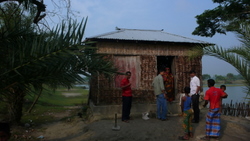Objectives

They were :
Analyze two specific contexts (including the development of analysis tools).
Develop LCH (low-cost housing) construction models adapted to the contexts studied, with a significant local socio-economic impact and which can play a role in the overall improvement of local housing.
To develop a methodology and tools that will enable the implementation of disaster preparedness plans (linked to housing) in the various homogenous territories of Bangladesh.
Propose strategies for implementing these disaster preparedness and habitat improvement plans.
Results
- Improvements were proposed and implemented for the construction of 500 conventional buildings.
- 25 control buildings were built on each of the two experimental sites (cyclones, floods).
- Consideration has been given to extending the current project to the whole country, as part of the housing improvement (risk reduction) and disaster preparedness program.
Achievements associated with the project
- Setting up a research internship with Grenoble's Joseph Fourrier University (UJF) for a student architect: '.To develop methodologies for designing, coordinating and monitoring minimum cost housing at distinctive regions of Bangladesh keeping in harmony with social, cultural, economic, climatic and users’ adaptability of the regions‘.
- Participation in a seminar entitled 'Global and Local Perspectives of Low-cost Housing' (Bangladesh, Dhaka, BUET, April 28, 2010 with three papers on : Universality of Earthen Architecture, Tradition and Modernity ; Education for Earthen Architecture: the UNESCO Chair Earth Architecture ; Earthen Architecture, Local Building Culture. A Potential for Sustainable Development.
Partners
CRAterre, Secours Catholique / Caritas France (SC / CF), Caritas Bangladesh (CB), Bangladesh University of Engineering and Technology (BUET)





